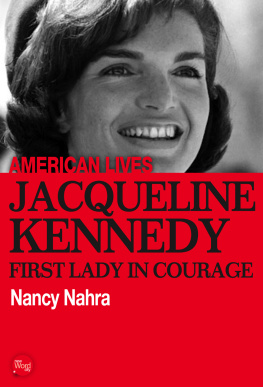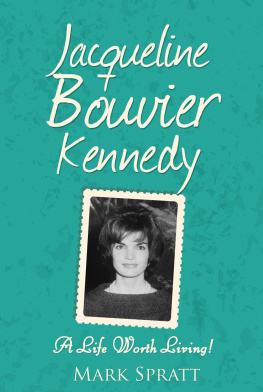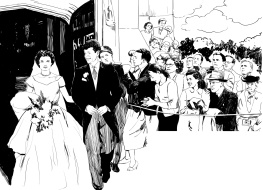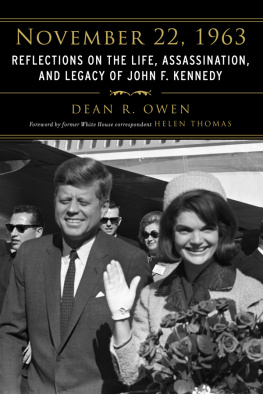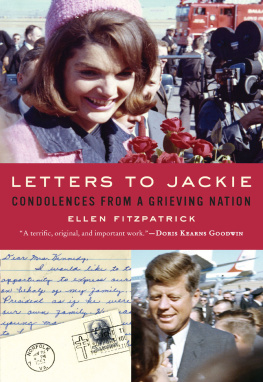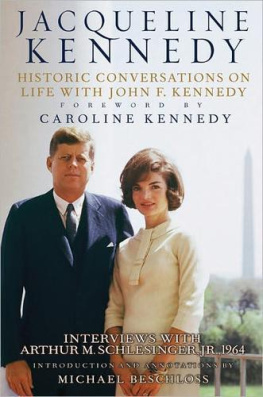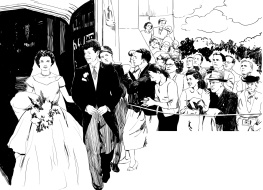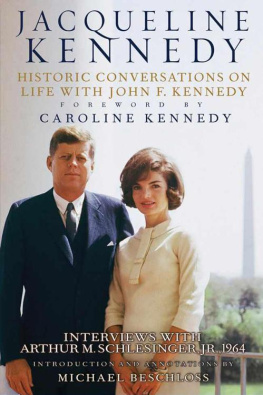There was nothing wrong with the girls intellligence. Jacqueline Bouvier had learned to read before she started kindergarten, and she was only six years old when her mother found her with a book of short stories by the very grown-up author Anton Chekhov on her lap. A quick set of questions showed that she had taken in most of what she read; she had just one question: Whats a midwife?
The problem was the way she behaved. All this happened back in the 1930s, and Jackie kept bursting out of the sedate, demure mold of Miss Chapins School, the elite Manhattan academy where privileged young girls were taught the manners that would prepare them for society life. She was altogether too lively and inquisitive. Compared to running and exploring in Central Park, school was dull - and when she finished her lessons ahead of her classmates, she would distract their attention from their own work by talking to them. The teachers sent her to the headmistresss office more often than any other student, and she got a D in deportment for being insufficiently quiet and passive.
After a long series of conferences among Jackies parents and the teachers, it was the headmistress, Miss Stringfellow, who found the solution. Riding lessons, she said, would teach the child discipline, because learning to ride a horse required hours of patient repetition and rigorous attention to detail. This was not exactly a new concept. Jackies mother was a noted horsewoman and had been perching her daughter atop horses since the child was two. But formal lessons hadnt been on the agenda until the headmistress spoke up. And when the lessons started, the prescription worked. Jackie fell in love with riding.
Miss Stringfellow drove the lesson home with a schoolmarmish note: I know you love horses and you yourself are very much like a beautiful thoroughbred. You can run fast. You have staying power. Youre well built, and you have brains. But if youre not properly broken and trained, youll be good for nothing. Suppose you owned the most beautiful race horse in the world. What good would he be if he wasnt trained to stay on the track, to stand still at the starting gate, to obey commands? He couldnt even pull a milk truck or a trash cart. He would be useless to you, and you would have to get rid of him.
And Jackie took it to heart. She would never be a demure society belle. All her life, she did things her way, often against the grain of conventional wisdom and public expectation. But she broke her many molds with disciplined restraint and judgment. And she won her own place in Americas heart as the attractive, accomplished wife of President John F. Kennedy, then as the widow who showed a stunned nation how to mourn his assassination, and finally as a woman in her own right, who lived the life she wanted and made a career that won honors and respect. It was to be a life of triumph, repeated tragedy, and a great deal of personal grace under fire as she fought to preserve the ideals and the legacy so vital to her, her children, and her country.
Go Exercise Your Pony
She was born on July 28, 1929, only months before the stock market crash of October 29. It was the dawn of the Great Depression, when millions of Americans were to go through years of misery and deprivation. But as the first child of Janet Lee Bouvier and John Vernou Black Jack Bouvier III, Jacqueline Bouvier seemed insulated from all this. In the world of her childhood, people lived in grand apartments and on estates with names, not houses with street numbers. The Bouviers spent their summer months at Lasata, a fourteen-acre property in East Hampton on Long Island, and the rest of the year in Manhattan in an elegant, eleven-room apartment in the imposing building at 740 Park Avenue. She was baptized a Catholic in the grand St. Ignatius Loyola Church, but theres no record that religion ever played a major role in her life.
Her fathers family had accumulated great wealth in real estate and finance long before he tried his luck on Wall Street and became known for his permanent tan and flamboyant flair. Although Jackies names suggest otherwise, Black Jacks French ancestry counts for only part of her heritage; he also had English and Scottish forebears, and Jacquelines mother was born of Irish parents, who had fled their country during the Great Potato Famine.
In East Hampton, many wealthy families were shaken from their safe and steady world by the Wall Street crash. And beneath the insulation, even men as wealthy as Jackies father learned that they could lose - and lose big. His Wall Street fortune had become a fiction. He was living rent-free in the big Park Avenue home, thanks to his father-in-law, who owned the building. He was in debt and being chased for back taxes by the Internal Revenue Service, and he was keeping up his high-society faade and club memberships by constant scraping and loans from relatives.
That kind of financial pressure put a strain on many marriages, including the Bouviers, which had never been entirely happy in any case, since Black Jack was known for his drinking and gambling. A strikingly good-looking man with an imposing physique and ice-blue eyes, Black Jack was a compulsive womanizer, and he scarcely bothered to hide his dalliances. His wife, Janet, was a complete contrast. Chic and impeccably groomed, an accomplished horsewoman with a dazzling smile, she was also a somewhat withdrawn disciplinarian who had an explosive temper. Jackie was dazzled by her father and equivocal about her mother. As their quarrels over money and his infidelity raged over her head, she grew up with a sense of insecurity and a gnawing fear of becoming poor.
The patriarch of the family - and her fathers financial lifeline - was his father, John Vernou Bouvier, Jr. - Grampy Jack to Jackie, The Major to most people. A lawyer who had become a partner in a Wall Street firm, the Major, as the squire of Lasata, was an East Hampton institution, a dapper figure with a waxed Hercule Poirot mustache and a dashing red convertible. He was a loud, swashbuckling presence at the fashionable Maidstone Club and the summer horse shows. He adored his granddaughter Jackie, who returned the sentiment. A lover of poetry and literature in general, he nurtured both tastes in her.
As the years passed, the quarrels between her parents became more frequent and heated - and all too plain to Jackie, her sister Caroline Lee, four years younger, and the servants. Jackie now had a pony, and she knew that when she was told, Why dont you go and exercise your pony, it meant that she was to leave the room so her parents could argue. To shut out the emotional turmoil, she learned to bury herself in her reading, beginning with the worlds of Winnie the Pooh, The Wizard of Oz, and The Jungle Book, and moving on to dozens of others, including Gone With the Wind and the poems of Lord Byron.
Her parents quarrels were also the first source of Jackie Bouvier Kennedys most enduring quality, a paradoxical one for such a public figure: her sense of privacy. All her life she tried to protect herself and those she cared about from public view, concealing her own emotions and quickly casting off any friends who betrayed her confidences. She hid behind the perfection of her designer clothing, her gleaming coiffure, and her disciplined poise. It was all the legacy of Miss Chapins School, hardened by a lifetime of all-too-public setbacks and pain.
Jackie was only seven when her mother could no longer tolerate Black Jacks infidelity and free-spending life. But when they separated, at first on a trial basis, no one outside their house knew about it. And when he moved back in after six months, it was as if nothing had changed. All through this private upheaval in 1936 and 1937, the society pages of TheNew York Times show Mr. and Mrs.John Vernou Bouvier III, again and again, hosting parties, attending parties together, and being seen at society galas. Publicly, the family maintained the fiction that life was just fine.
Next page
